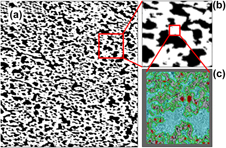Crossref Citations
This article has been cited by the following publications. This list is generated based on data provided by
Crossref.
Vásárhelyi, L.
Kónya, Z.
Kukovecz, Á.
and
Vajtai, R.
2020.
Microcomputed tomography–based characterization of advanced materials: a review.
Materials Today Advances,
Vol. 8,
Issue. ,
p.
100084.
Tallarek, Ulrich
Hochstrasser, Janika
Ziegler, Felix
Huang, Xiaohui
Kübel, Christian
and
Buchmeiser, Michael R.
2021.
Olefin Ring‐closing Metathesis under Spatial Confinement: Morphology−Transport Relationships.
ChemCatChem,
Vol. 13,
Issue. 1,
p.
281.
Liu, Zhen
Li, Li
Zhang, Shawn
Lomeo, Josh
Zhu, Aiden
Chen, Jacie
Barrett, Stephanie
Koynov, Athanas
Forster, Seth
Wuelfing, Peter
and
Xu, Wei
2021.
Correlative Image-Based Release Prediction and 3D Microstructure Characterization for a Long Acting Parenteral Implant.
Pharmaceutical Research,
Vol. 38,
Issue. 11,
p.
1915.
Nagapudi, Karthik
Zhu, Aiden
Chang, Debby P.
Lomeo, Joshua
Rajagopal, Karthikan
Hannoush, Rami N.
and
Zhang, Shawn
2021.
Microstructure, Quality, and Release Performance Characterization of Long-Acting Polymer Implant Formulations with X-Ray Microscopy and Quantitative AI Analytics.
Journal of Pharmaceutical Sciences,
Vol. 110,
Issue. 10,
p.
3418.
Barreiros Salvado, M.
Schott, P.
Guétaz, L.
Gerard, M.
David, T.
and
Bultel, Y.
2021.
Towards the understanding of transport limitations in a proton-exchange membrane fuel cell catalyst layer: Performing agglomerate scale direct numerical simulations on electron-microscopy-based geometries.
Journal of Power Sources,
Vol. 482,
Issue. ,
p.
228893.
Zhang, Shawn
Nagapudi, Karthik
Shen, Mike
Lomeo, Joshua
Qin, Yuri
Zhu, Aiden
Nayak, Purnendu
Chang, Debby
and
Hannoush, Rami N.
2022.
Release Mechanisms and Practical Percolation Threshold for Long-acting Biodegradable Implants: An Image to Simulation Study.
Journal of Pharmaceutical Sciences,
Vol. 111,
Issue. 7,
p.
1896.
Soleymani, Amir Peyman
Parent, Lucas R.
and
Jankovic, Jasna
2022.
Challenges and Opportunities in Understanding Proton Exchange Membrane Fuel Cell Materials Degradation Using In‐Situ Electrochemical Liquid Cell Transmission Electron Microscopy.
Advanced Functional Materials,
Vol. 32,
Issue. 5,
Jia, Wei
Yawman, Phillip D.
Pandya, Keyur M.
Sluga, Kellie
Ng, Tania
Kou, Dawen
Nagapudi, Karthik
Luner, Paul E.
Zhu, Aiden
Zhang, Shawn
and
Hou, Hao Helen
2022.
Assessing the Interrelationship of Microstructure, Properties, Drug Release Performance, and Preparation Process for Amorphous Solid Dispersions Via Noninvasive Imaging Analytics and Material Characterization.
Pharmaceutical Research,
Vol. 39,
Issue. 12,
p.
3137.
Zaccarine, Sarah F.
Shviro, Meital
Weker, Johanna Nelson
Dzara, Michael J.
Foster, Jayson
Carmo, Marcelo
and
Pylypenko, Svitlana
2022.
Multi-Scale Multi-Technique Characterization Approach for Analysis of PEM Electrolyzer Catalyst Layer Degradation.
Journal of The Electrochemical Society,
Vol. 169,
Issue. 6,
p.
064502.
Bayat, Mutlucan
Kaskun Ergani, Songül
Daşdemirli, Yakup
and
Kayfeci, Muhammet
2023.
Handbook of Thermal Management Systems.
p.
371.
Batool, Mariah
Godoy, Andres O.
Birnbach, Martin
Dekel, Dario R.
and
Jankovic, Jasna
2023.
Evaluation of Semi-Automatic Compositional and Microstructural Analysis of Energy Dispersive Spectroscopy (EDS) Maps via a Python-Based Image and Data Processing Framework for Fuel Cell Applications.
Journal of The Electrochemical Society,
Vol. 170,
Issue. 5,
p.
054511.
Jankovic, Jasna
2023.
The 3D secrets of fuel cell catalyst layers.
Nature Catalysis,
Vol. 6,
Issue. 5,
p.
378.
Olbrich, W.
Kadyk, T.
Sauter, U.
Eikerling, M.
and
Gostick, J.
2023.
Structure and conductivity of ionomer in PEM fuel cell catalyst layers: a model-based analysis.
Scientific Reports,
Vol. 13,
Issue. 1,
Ahmed-Maloum, Mohamed
David, Thomas
Guetaz, Laure
Duru, Paul
Pauchet, Joël
Quintard, Michel
and
Prat, Marc
2023.
Computation of oxygen diffusion properties of the gas diffusion medium -microporous layer assembly from the combination of X-ray microtomography and focused ion beam three dimensional digital images.
Journal of Power Sources,
Vol. 561,
Issue. ,
p.
232735.
Taherian, Reza
2024.
Polymer/nanodiamond Nanocomposites.
p.
223.
Farsi, Aida
Zhu, Lijun
Seip, Tess
and
Bazylak, Aimy
2024.
Predicting Liquid Organic Hydrogen Carrier Saturation in Dehydrogenation Cell Gas Diffusion Layers for Hydrogen Storage.
ChemCatChem,
Batool, Mariah
Sanumi, Oluwafemi
and
Jankovic, Jasna
2024.
Application of artificial intelligence in the materials science, with a special focus on fuel cells and electrolyzers.
Energy and AI,
Vol. 18,
Issue. ,
p.
100424.
Martinaiou, Ioanna
and
Daletou, Maria K.
2024.
Enhancing Electrode Efficiency in Proton Exchange Membrane Fuel Cells with PGM-Free Catalysts: A Mini Review.
Energies,
Vol. 17,
Issue. 14,
p.
3443.
Ercelik, Mustafa
Ismail, Mohammed S.
Hughes, Kevin J.
Ingham, Derek B.
Ma, Lin
and
Pourkashanian, Mohamed
2024.
X-ray CT-based numerical investigation of nickel foam-based GDLs under compression.
International Journal of Hydrogen Energy,
Vol. 50,
Issue. ,
p.
1338.



